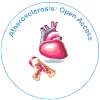开放获取期刊获得更多读者和引用
700 种期刊 和 15,000,000 名读者 每份期刊 获得 25,000 多名读者
抽象的
Knowledge of Ischemic Heart Disease: Causes, Signs, Evaluation, and Management
Christopher Kark
Ischemic Heart Disease (IHD), characterized by reduced blood supply to the heart muscle, poses a significant
global health challenge. This article comprehensively explores the causes, signs, evaluation, and management of
IHD. The primary cause, atherosclerosis, is examined in conjunction with modifiable risk factors such as smoking,
hypertension, high cholesterol, diabetes, obesity, and physical inactivity. Symptoms of IHD, including angina, shortness
of breath, fatigue, and the critical indicator of a heart attack, are detailed to enhance recognition and prompt intervention.
Diagnostic procedures, including electrocardiograms, stress testing, coronary angiography, and blood tests, are outlined
for a thorough evaluation. The article also delves into diverse treatment options, ranging from lifestyle modifications to
medications, interventional procedures, and surgical interventions like Coronary Artery Bypass Grafting (CABG). By
providing a comprehensive overview, this article aims to enhance understanding, facilitate early detection, and promote
effective management of Ischemic Heart Disease, ultimately contributing to improved patient outcomes and a reduction
in the global burden of cardiovascular diseases.

 English
English  Spanish
Spanish  Russian
Russian  German
German  French
French  Japanese
Japanese  Portuguese
Portuguese  Hindi
Hindi